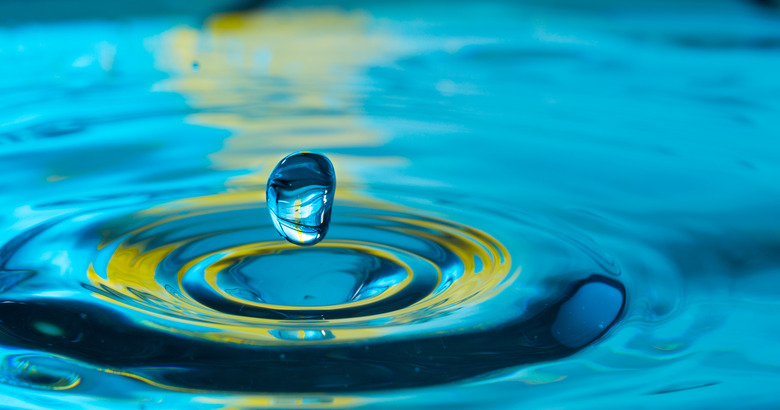What Is The Specific Gravity Of Water?
Every material object, whether liquid, solid or gas, has a characteristic density that you calculate by determining the mass of the object and the volume it occupies. The calculation results in a number of units of mass divided by units of volume.
To avoid having to express the units, which can be cumbersome, scientists defined a quantity called specific gravity, which is density divided by the density of water at 4 degrees Celsius and at atmospheric pressure. It follows that water at that temperature and pressure has a specific gravity of 1, but water containing impurities has a specific gravity that varies slightly from 1.
TL;DR (Too Long; Didn't Read)
Calculate the _density_ of an object of mass M occupying a volume V using the formula D = M ÷ V. Calculate the object's _specific gravity_ by dividing its density by the density of water at 4 degrees Celsius. It follows that pure water has a specific gravity of 1 or close to 1 depending on temperature.
Determining Specific Gravity
Determining Specific Gravity
To determine the dimensionless quantity called specific gravity, you divide the density of a material by the density of water at 4 degrees Celsius. For this calculation to work, the density of the material and that of water must be expressed in the same units. Here is the density of water in various units:
- 1 gram per cubic centimeter
- 1000 kilograms per cubic meter
- 62.43 pounds per cubic foot
- 0.036 pounds per cubic inch
For example, the density of lead is 11.36 grams per cubic centimeter (g/cc). Divide by the density of water in the same unit to get the specific gravity of lead, 11.36.
Expressed in different units, the density of lead is 0.41 pounds per cubic inch (lbs/in3). Divide this by the density of water in the same units – 0.036 lbs/in3 – to get the same number, 11.36.
Specific Gravity as a Measure of Impurity Concentration
Specific Gravity as a Measure of Impurity Concentration
Because water at 4 degrees Celsius is the standard scientists use to determine specific gravity, it follows that its specific gravity is 1. However, a water sample at a different temperature or pressure or one containing impurities has a density that differs slightly. Measuring the density of the sample and dividing that by the density of pure water at 4 degrees Celsius to get specific gravity can give you information about the sample. If the specific gravity is more than 1, the temperature of the sample is 4 degrees C, and it's at atmospheric pressure, the sample contains impurities. If you know which impurity the water sample contains, its specific gravity can tell you the concentration.
Cite This Article
MLA
Deziel, Chris. "What Is The Specific Gravity Of Water?" sciencing.com, https://www.sciencing.com/what-specific-gravity-water-4675094/. 20 April 2018.
APA
Deziel, Chris. (2018, April 20). What Is The Specific Gravity Of Water?. sciencing.com. Retrieved from https://www.sciencing.com/what-specific-gravity-water-4675094/
Chicago
Deziel, Chris. What Is The Specific Gravity Of Water? last modified March 24, 2022. https://www.sciencing.com/what-specific-gravity-water-4675094/
